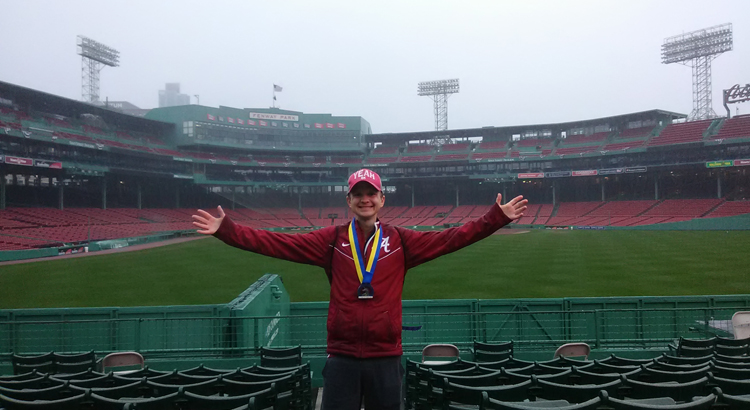This is part of a series of posts from nominees and nominators for our LifeChanger of the Year educator recognition program. We meet scores of fascinating LifeChangers every year who have interesting perspectives to share about children, education and life.
There’s so much about running the Boston Marathon that is foreign to a rural school teacher from Alabama. As I traveled out to the starting line, I could see enough snow on the ground, a dusting, to cancel school back home.
While the snow was the least of my eventual worries that day -the hard rain took care of that — the comfort I found that morning came from the vehicle I road on to the starting line: a school bus.
I’ve taught middle school students English in the small town of Columbiana since 2003. When we recently took our students to a Double-A professional baseball game in downtown Birmingham, some of my students thought downtown looked a lot like New York City. It was the first time they’d ever seen buildings so tall.
Outside of my passion for teaching adolescents reading and writing, I have an equally puzzling passion for distance running. Since 2007, I’ve navigated the one traffic light by my school enough times in the afternoon to get in the training that’s sent me to Boston four times, including the 2014 race after the 2013 bombing tragedy.
Working with students who are often very unhappy at their stage of life and working on a 26.2-mile race are similar in that you learn to keep hope. I suppose all of us draw from our own lives to improve our professional practice, but I believe this year’s Boston taught me a lot about teaching.
This year’s race was over for me before it even started. Once we unloaded from the school bus to wait behind Hopkinton Middle School, a far different look to a publicly funded school from what I was used to, the snow/rain/mud mix immediately ruined the shoes and socks I’d brought out. I’d prepared for this by bringing an extra pair, but once I got seated under the tent to wait, I realized I’d lost my extra socks.
Five minutes later, a man sat down right next to me and started telling his good friend all of the “extra” things he’d brought for the race.
“I don’t suppose you have extra socks?” I asked. “I think you’re in luck.”
I was in luck, and it wasn’t just with the socks. I knew my dreams of running a sub-three hour race were “gone with the wind.” we runners had a 25-30 mph headwind all the way back into town that was probably what made the race so tough. However, I was fairly confident that I’d make it back. This was a race in which I had to forget about time, forget the watch and just embrace the absurdity that had led me to spend a personal day running in the pouring rain and freezing cold, and paying someone to do it.
I had faith in my training, but I found the faith to finish in part due to the crowds. It was a horrible day to run, but it was an even more horrible day to spectate. Nevertheless, people were out all along, yelling, screaming, and I believe, willing us all to the finish. The city treats us runners like superheroes that day.
Once I finished and took a warm shower, I was so proud I’d made it. Over 25,000 runners finished this year’s race. Over 95 percent of the field that started, finished the race. My story isn’t remarkable, heroic, or important, but it reminds me that the people we work with, especially children, all have their own stories. We can be their “extra sock” angels and we can be their supporters alongside the road they pursue to their dreams, even when the conditions they endeavor through are absurdly ridiculous.
One of my former students was accepted into Harvard. He begins this fall. I can’t wait to see him out on the course the next time I run Boston.
Jason Mayfield nominated Sheikla Blount for the LifeChanger of the Year award. Learn more about Blount on her LifeChanger of the Year profile.
TC100537(0418)3

